Amid growing trade and economic cooperation in the region, M.K. Bhadrakumar looks at how smaller countries there are trying to steer clear of Washington’s attempts to cause friction between them and China.
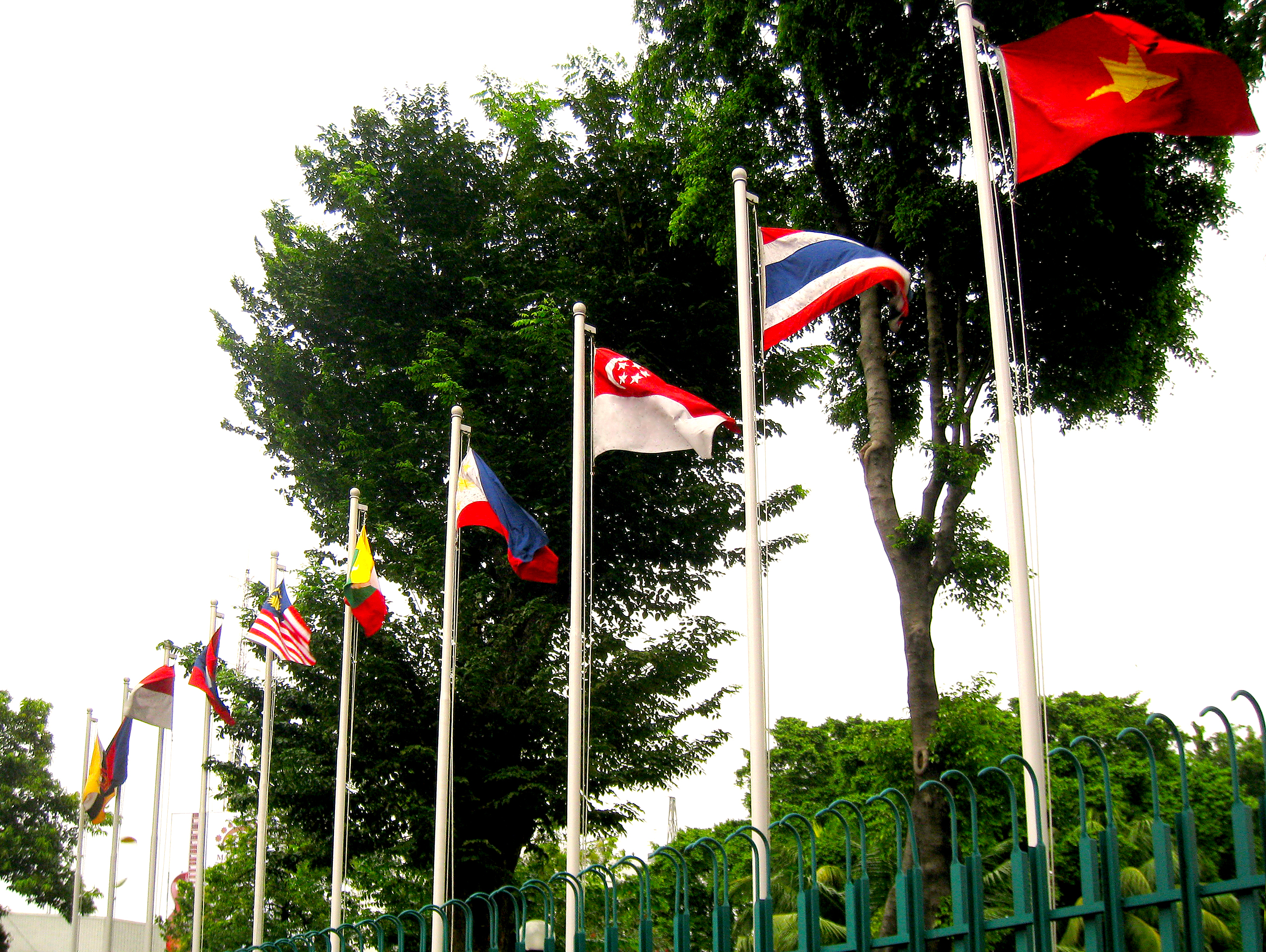
ASEAN flags at the Jakarta headquarters. (Gunawan Kartapranata, Wikimedia Commons, CC BY-SA 3.0)
By M.K. Bhadrakumar
Indian Punchline
 On Monday, while delivering the keynote address at the annual China Business Summit held in Auckland, New Zealand Prime Minister Chris Hipkins weighed in on the power dynamic in the Indo-Pacific.
On Monday, while delivering the keynote address at the annual China Business Summit held in Auckland, New Zealand Prime Minister Chris Hipkins weighed in on the power dynamic in the Indo-Pacific.
New Zealand’s estimation matters because it is a small country in the Southern Pacific heavily dependent on trade with China for preserving its prosperity and yet one of the Five Eyes (along with the U.S., U.K., Australia and Canada), the exclusive secretive security grouping of Anglo-Saxon countries.
Hipkins’ speech came just three weeks after his return from Beijing on an official visit with a business delegation when he met with China’s President Xi Jinping.
In the meantime, Hipkins had just returned from the NATO Summit in Vilnius last week. New Zealand PMs have begun attending the NATO summits since last year as one of “IP4,” the alliance’s four Indo-Pacific partners (joining Australia, Japan and South Korea.)
The Chinese readout of Xi’s meeting with Hipkins in Beijing on June 27 attributed the following remarks to the latter:
“He [Hipkins] said that New Zealand values its relations with China… (and) believes that bilateral relations should not be defined by differences, and it is important that the two sides have candid communication, mutual respect, and harmony without uniformity. New Zealand is willing and ready to maintain communication with China on helping island countries develop.”
But at Auckland on Monday, Hipkins added caveats:
“China’s rise and how it seeks to exert that influence is also a major driver of the increasing strategic competition, particularly in our wider home region, the Indo-Pacific. Our region is becoming more contested, less predictable, and less secure. And that poses challenges for small countries like New Zealand that are reliant on the stability and predictability of international rules for our prosperity and security.”
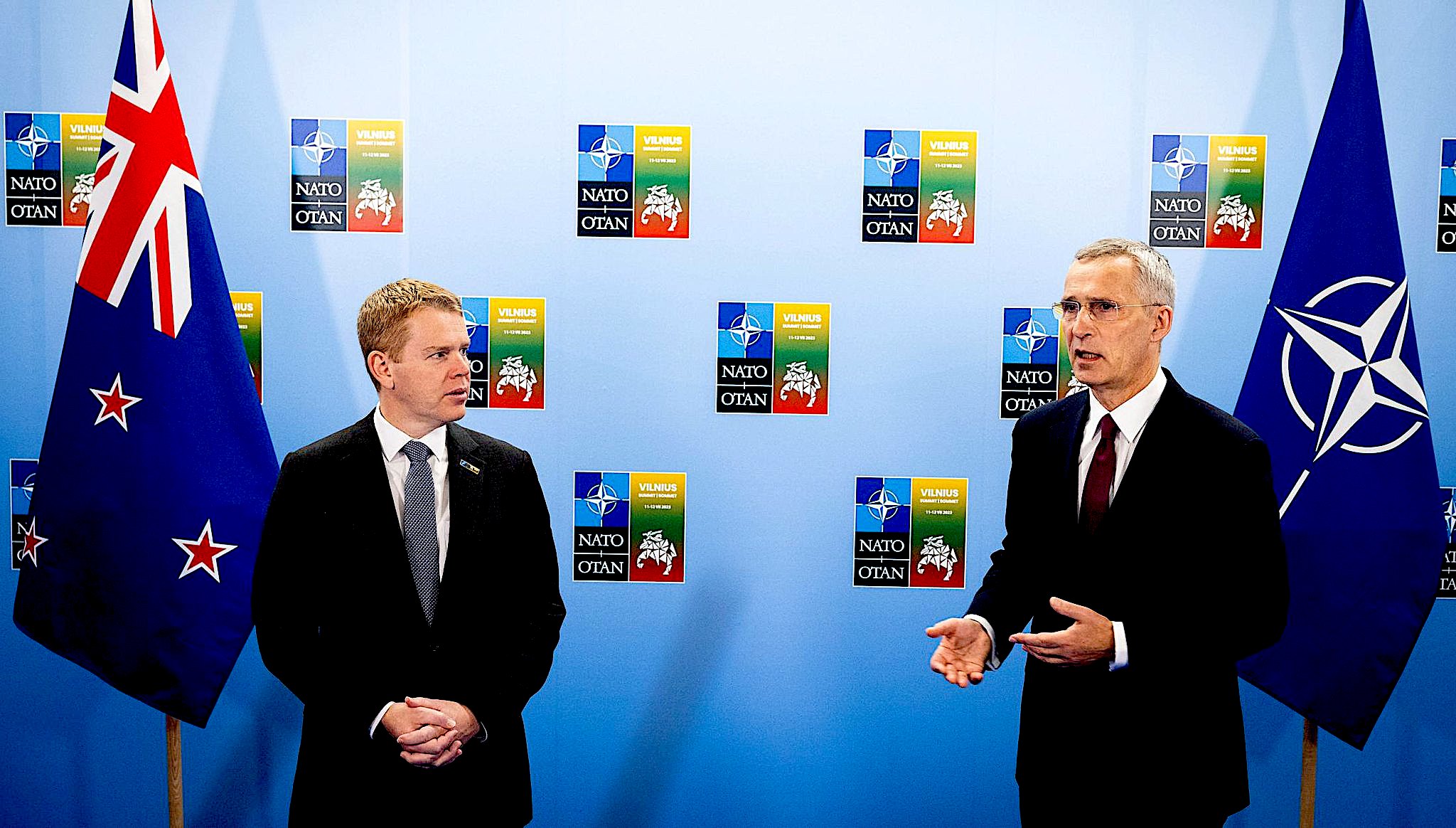
Hipkins with NATO Secretary General Jens Stoltenberg on July 11 during the alliance summit in Vilnius. (NATO/Flickr)
What emerges is that the traditional security concepts of balancing and band-wagoning are insufficient for understanding how smaller states like New Zealand are responding to U.S.–China rivalry. (See the USIP commentary New Zealand Draws Closer to NATO with a Wary Eye.)
This was also the leitmotif of the foreign and security policy choices exhibited by the Association of Southeast Asian Nations’ summit and related events in Jakarta in last weekend.
‘Not an Arena for Proxy Wars’
U.S. Secretary of State Antony Blinken’s single-minded mission at Jakarta was to rally ASEAN members to the U.S. banner. But ASEAN countries are choosing their own path, which is not to choose sides between the U.S. and China.
Even Singapore, the U.S.’ closest ally in southeast Asia, has begun to differ. Foreign Minister Vivian Balakrishnan told reporters ahead of the ASEAN Regional Forum in Jakarta on Friday that the ASEAN countries do not want to be divided or be vassal states, “or worse, an arena for proxy wars.”
The U.S. underestimates the strength and resilience of the cooperative relations that have been forged between ASEAN countries and China. Simply put, the diplomatic and political engagement between China and the ASEAN in Jakarta last week showed that there is a shared will to not let differences and disputes disrupt national or regional development.
The trade volume between ASEAN and China touched $431.3 billion in the first half of this year, according to latest official data, an increase of 5.4 percent compared with the same period last year.
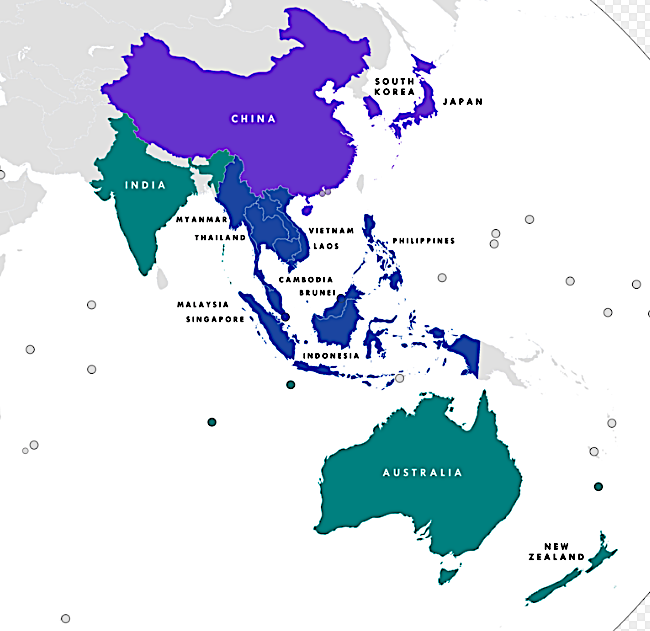
Graphic showing dialogue partners of ASEAN — in blue — and the Plus 3 in purple — China, Japan, South Korea — and Plus 6 in green — India, Australia, New Zealand. (Tiger7253, Wikimedia Commons, CC BY-SA 4.0)
The meetings in Jakarta last week indicated that the ASEAN countries do not want the U.S. to make the region another arena for its destructive power games. The completion of the second reading of the text for a Code of Conduct in the South China Sea, and the adoption of a guideline document for its early conclusion, sent out a clear signal that the ASEAN region will not allow any seeds of discord to take root.
Of course, this momentum serves China’s interests while it undercuts the U.S. attempts to create friction in ASEAN’s relations with China.
Indonesian President Joko Widodo told regional foreign ministers who gathered in Jakarta on July 14 that ASEAN should not become a proxy to any power.
Interestingly, alluding to the Western attempts to split the ASEAN, Widodo underscored to the regional foreign ministers who were paying him a courtesy call (including the QUAD foreign ministers) that the ASEAN is committed to strengthening its unity, solidarity and centrality in maintaining peace and stability in the region.
“ASEAN cannot be a competition, it can’t be a proxy of any country, and international law should be respected consistently,” he said.
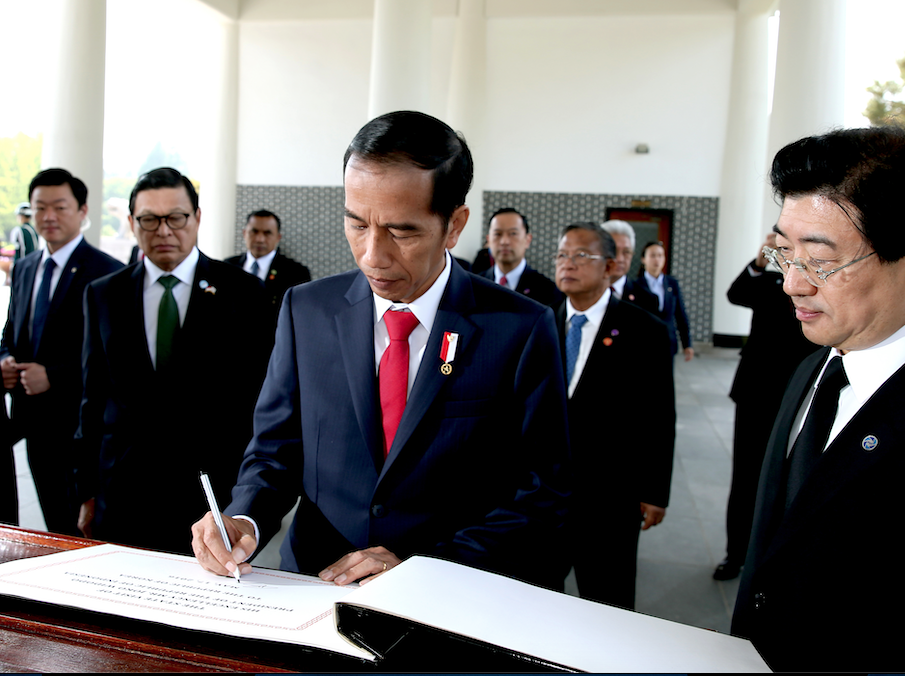
Indonesia’s Widodo visiting Seoul National Cemetery in 2016. (Wikimedia Commons, CC BY-SA 2.0)
In effect, the 18-nation East Asia Summit which was held during the ASEAN Summit, witnessed for the first time the concept of neutrality combining with the concept of ASEAN centrality and the ASEAN Outlook on the Indo-Pacific.
Significantly, last week, in Jakarta ahead of the ASEAN summit, the foreign minister of Indonesia, Retno Marsudi, held a trilateral meeting with her Russian counterpart Sergei Lavrov and Wang Yi, the Chinese CCP Central Committee’s foreign policy chief and Politburo member.
The Chinese and Russian readouts (here and here) show a high level of satisfaction that the ASEAN is getting its act together, which strengthens the shift to a multipolar world order. To be sure, a key item for discussion would have been Indonesia’s BRICS membership.
Indonesia will be a strategic asset for BRICS. Historically, hedging as a concept arose out of the dialectics of the traditional security concepts of balancing and band-wagoning.
But Indonesia is creatively taking matters to a “post-hedging” security paradigm where states big and small are shifting to economic policy as the meaningful indicator of security alignment.
Simply put, the Southeast Asian states want a stable geopolitical environment to focus on their economic development and do not want to be forced to “take sides” in any hegemonic rivalry.
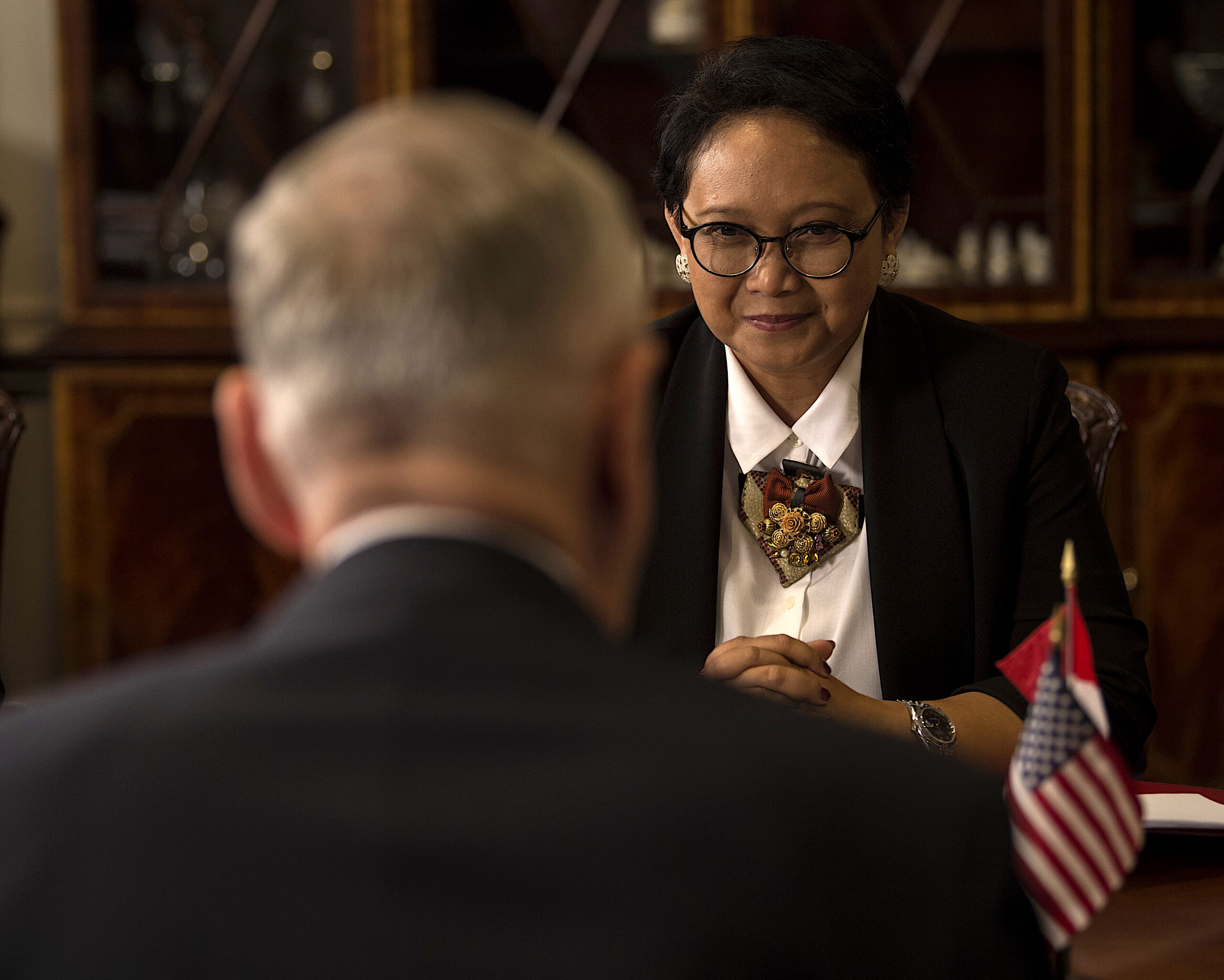
Indonesia’s Retno Marsudi meeting with U.S. Defense Secretary James Mattis at the Pentagon in 2018. (DoD, Kathryn E. Holm)
However, this transition won’t be smooth. The U.S. is weaponising economic and technological connectivity, making it a source of geopolitical power and vulnerability. If weaponised interdependence means that more economic and technological policies are perceived as zero-sum, the policy space for hedging shrinks, in principle.
But then, a government might choose Chinese telecommunications providers purely based on cost, speed of rollout and superior quality, and disregard the West’s paranoia about network security risks. This is already happening in the Gulf region. The smaller nations’ motivation cannot be underestimated.
Besides, China has had a head start. The launch of the Regional Comprehensive Economic Partnership and evolving investment flows look set to further strengthen the strong economic links between ASEAN and China.
The ASEAN-China trade corridor stretching from the cold and dry steppes in northern China to the tropical jungles of Indonesia generates a diverse range of commercial activity, with each geography equipped with its own competitive advantage.
Thus, China’s Pearl River Delta, Thailand and Vietnam, for example, are all important manufacturing hubs, while Indonesia and Malaysia are rich in natural resources. Hong Kong and Singapore are international financial centres and Shenzhen is shaping up to be Asia’s Silicon Valley.
The potential economic impact will be huge. ASEAN trade to China is moving up the value chain. Looking to the future, green development and promoting innovation will be key areas of strategic focus.
And these ambitions will be realised by investment. Equally, as the Chinese economy undergoes a tech-driven transformation, its homegrown innovations will be exported to other countries. ASEAN is a prime candidate.
Chinese companies are already building data centres and 5G networks across the ASEAN region. The Chinese ambassador to the ASEAN Hou Yanqi recently called the China-ASEAN common space the “epicentrum of growth” in the world economy.
M.K. Bhadrakumar is a former diplomat. He was India’s ambassador to Uzbekistan and Turkey. Views are personal.
This article originally appeared on Indian Punchline.
The views expressed are solely those of the author and may or may not reflect those of Consortium News.

Sometime after 9/11, George W. Bush proclaimed “You’re either with us or against us!” At that time, an American leader could pose this choice as a rhetorical question, and be confident of the world’s answer. After all that’s happened since, no U.S. president would risk posing the question, as the answer in much if not most of the world would be: “Against.”
Biden’s Tech-War against Beijing “Goes Nuclear”. China and The Battle for Semiconductors
add this to the global existential threats mix by the full spectrum dominance complex
hxxps://www.globalresearch.ca/bidens-tech-war-goes-nuclear-2/5826500
ASEAN has made a smart move not to take sides despite powerful coercion from the world’s biggest trouble maker – the USA. The US’ neverending quest to dominate the world for its own selfish national interests is a matter of great global concern. This is not only harming global human development and advancement but also world peace. lt is deploying its military might to coerce and bully other nations to bend to its will. lts “you are either with us or against us” ultimatum to nations is splitting this world into two big warring factions. The world has to wake up and push against this dangerous American bullying. This world does not belong to Americans alone. The US has no right to dictate to the rest of the world what they can and cannot do. Basing on its hegemonic behavior on the world stage, the US is not qualified to be a global leader. A global dictator is an ideal label for it.
A useful and well-informed article.
The lawless USA wishes law to be abandoned. It wants gangster “rules” to replace law. It wants to set the gangster “rules”. It wants no law above it, no judge to preside and no limit placed on its violent enforcers. Like the mob bosses of its gangster era, the gun is its ultimate “rule”, none of its crimes can be punished and laws don’t exist. It demands protection money from its “allies” and lives the good life on the proceeds of its crimes. Sadly, countries such as NZ and AUS pay their protection money willingly, in the hope of being on the right side of the gangsters. Here in Australia it is bi-partisan policy. Which ever way you vote you get the USA gangsters.
“We spend $850 Billion dollars a year to support our Department of War, so by golly there has to be war somewhere every day of the year to justify this aburd amount of money. ”
This says it all! … ‘By golly’??? Love it!
Thank you M.K. Bhadrakumar for your excellent analysis, it is greatly appreciated.
Given the context, readers may be interested to know what’s happening in the Solomon Islands re China and the US.
A canny political leader is currently managing to play off both Washington and Canberra to his peoples’ advantage – at least that’s the way it seems at present.
See: hxxps://johnmenadue.com/us-and-australian-paternal-interference-in-the-solomon-islands/
All European cultures are being coerced into allegiance to their root out of fear of being excluded. It clearly shows the sense world dominance and superiority of culture is at risk of having to learn to share the world rather than dominate the world. Western history over the centuries cannot be avoided forever. It NATO seeks to over power world culture militarily as in the past all of human civilization is at risk. European countries may be bowing down for fear of losing connection military technology above their grade but it contains extremely dangerous consequence in our interconnected world.
Robert, good comment. I would say that if those people you named had been kept on this side of the world in 2014, not 2021, there would not have been the war. However, this war was planned and instigated by the US ever since Putin took office. Without NATO creep surrounding Russia, and without the 2014 US coup, there wouldn’t have been 8 years, following the coup, of Nazis murdering 14000 Russian speakers in the Donbas. When Putin said he wanted to stop the Nazis, keep Crimea (Russian since 1773), and stop NATO in Ukraine which would have completed the encirclement of Russian with nuclear weapons pointed at Moscow, what reasonable person can’t grasp the simple logic of the facts.
If those countries think we’re giving up easily, they don’t understand that the US plays to win , plays hard, and plays dirty.
You can check out any time you like, but you can never leave.
It occurs to me that what the multipolar world does is operate on shared trade, respect, and increasing wealth. The Western model appears to be operating on coercion, hate, and power.
Articles like this should be read by every politician and Administrative state employee in Washington D.C.. It clearly shows that the non western world is trending to either neutrality or pro multi polarity. And China is the head of the alternative great power. Instead, our people in Washington ignore reality and recklessly pursue initiatives in an attempt to hold onto our single super power status. Our involvement with the Ukraine war being the most extreme example. If the Biden Administration had kept Blinken, Sullivan, Burns, and Nuland on our side of the Atlantic ocean in 2021, there would not be a war between Russia and Ukraine.
The only good thing coming out of the war is that it fully opened the eyes of non western governments that the US wants chaos, rather than peace, around the world. We spend $850 billion dollars a year to support our Department of War, so by golly there has to be war somewhere every day of the year to justify this absurd amount of money.